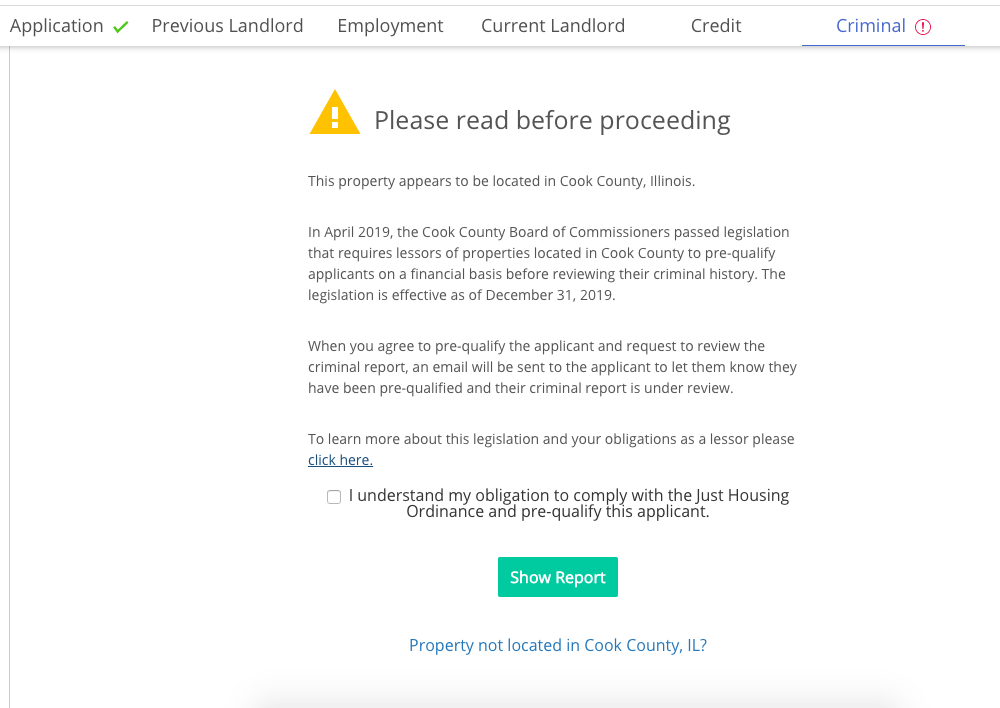Just Housing Ordinance Amendment for Cook County
In April 2019, the Cook County Commissioners approved a Just Housing Amendment (JHA) that impacts the screening process for any property located in the county.
The legislation prohibits lessors from inquiring about, or reviewing, an applicant's criminal history until the lessor has determined that the applicant pre-qualifies for the unit based on their application including their credit, eviction, and rental history check.
The intent of the ordinance is to prevent housing discrimination among persons with a criminal background. Any landlord or property management company in Cook County that conducts tenant screening will need to incorporate the new JHA procedure.
The legislation requires a two-step tenant screening process be followed:
- Pre-qualification (income, credit check, landlord verifications)
- Criminal background check
We’ve been working on improvements to Rent Application to help you comply with this two-step process.
After an applicant submits an application to a Cook County-based address, we’ll process the screening reports as usual, but we won’t display the criminal report until you explicitly acknowledge that the applicant is pre-qualified.
Here’s how that looks:
Additionally, after an applicant has satisfied the pre-qualification standards for housing, the amendment requires the lessor to notify the applicant that the first step of the screening procedure has been satisfied and that a criminal background check will be performed.
Here's what the email says:
Once you've clicked the button to confirm that the applicant pre-qualifies for tenancy, we'll send an email to the applicant, satisfying this requirement.
Once the box has been checked and the email sent, the criminal report is revealed to view. In the top left corner, you’ll see the email address of the user who pre-qualified the applicant, as well as the date the applicant was pre-qualified for your records.
Important Note Regarding the 3 year Limit for Criminal Records
In addition to the mandated multi-step process, the amendment prohibits lessors from considering any information related to criminal convictions that are more than three years old.
Most applicant’s criminal reports will not return any hits, but in the case that they do, as the decision-maker, the landlord would need to perform an Individualized Assessment.
“Individualized Assessment” means a process by which a person considers all factors relevant to an individual’s conviction history from the previous three (3) years. An individualized assessment is not required for convictions that are more than three (3) years old. Factors that may be considered in performing the Individualized Assessment include, but are not limited to:
- The nature and severity of the criminal offense and how recently it occurred;
- The nature of the sentencing;
- The number of the applicant’s criminal convictions;
- The length of time that has passed since the applicant’s most recent conviction;
- The age of the individual at the time the criminal offense occurred;
- Evidence of rehabilitation;
- The individual history as a tenant before and/or after the conviction;
- Whether the criminal conviction(s) was related to or a product of the applicant’s disability; and
- If the applicant is a person with a disability, whether any reasonable accommodation could be provided to ameliorate any purported demonstrable risk.
A housing provider must perform an individualized assessment prior to denying an individual housing based on criminal conviction history, except in the following circumstances:
(A) A current sex offender registration requirement pursuant to the Sex Offender Registration Act (or similar law in another jurisdiction); and/or
(B) A current child sex offender residency restriction.
Next steps:
Because it will be illegal to reject an applicant based on their criminal history before pre-qualifying them, we encourage you to review your application forms and remove any questions that inquire about criminal history.
If you need a quick refresher on how to do this, check out this article
We recommend that you review the full text of the amendment, available here, with your legal counsel. Please also reference the Cook County article here: https://www.cookcountyil.gov/content/just-housing-amendment-human-rights-ordinance
The effective date of this legislation is December 31, 2019 and enforcement began January 31, 2020.
We will continue to update this page as details are released by the Human Rights Commission.
New Jersey Fair Chance in Housing Act
Synopsis
In accordance with New Jersey S.B 250 / A.B. 1919 legislation, lessors are restricted from requiring an applicant to complete any rental application that includes any inquiries regarding the applicant’s criminal records prior to the provision of a conditional offer. Before accepting any application fee, the bill requires a lessor to disclose whether or not the eligibility criteria includes the review and consideration of criminal history. They must also supply the applicant with a statement that the applicant may provide evidence demonstrating inaccuracies within a criminal record or evidence of rehabilitation or other mitigating factors.
After the issuance of a conditional offer to an applicant, a housing provider may only consider a criminal record in the applicant’s history that:
(1) has occurred within the 10 years immediately preceding the issuance of the conditional offer; and
(2) consists of a pending criminal accusation or a criminal conviction that, pursuant to subsection b. of N.J.S.2C:52-2, is not eligible for expungement.
The legislation requires a two-step tenant screening process be followed to review criminal reports:
1. Pre-qualification (income, credit check, landlord verifications) and issuance of a conditional offer
2. Criminal background check review
We’ve been working on improvements to Rent Application to help you comply with this two-step process.
After an applicant submits an application to a New Jersey-based address, we’ll process the screening reports as usual, but we won’t display the criminal report until you explicitly acknowledge that the applicant is pre-qualified for tenancy.
Here’s how that looks:
Here's what the email says:
Once you've clicked the button to confirm that the applicant pre-qualifies for tenancy, we'll send an email to the applicant, satisfying this requirement.
Once the box has been checked and the email sent, the criminal report is revealed to view. In the top left corner, you’ll see the email address of the user who pre-qualified the applicant, as well as the date the applicant was pre-qualified for your records.
When Reviewing a Criminal Report
Per the New Jersey Fair Chance in Housing Act, you may only consider convictions for certain very serious crimes: murder, aggravated sexual assault, kidnapping, arson, human trafficking, certain other sexual assault violations (i.e., those in violation of N.J.S.A. § 2C:14-1), causing a child to engage in certain sexual acts (i.e., those in violation of N.J.S.A. § 2C:24-4(b)(3)); or any crime that resulted in a lifetime registration on a State sex offender registry;
indictable offenses of the first degree that were either issued in the past six (6) years, or that resulted in a conviction that concluded within the past six (6) years;
indictable offenses of the second or third degrees that were either issued in the past four (4) years, or that resulted in a conviction that concluded within the past four (4) years;
indictable offenses of the fourth degree that were either issued in the past one (1) year, or that resulted in a conviction that concluded within the past one (1) year.
Additional Steps
Because it will be illegal to reject an applicant based on their criminal history before pre-qualifying them, we encourage you to review your application forms and remove any questions that inquire about criminal history.
If you need a quick refresher on how to do this, check out this article
Review details regarding the legislation here: https://www.njoag.gov/about/divisions-and-offices/division-on-civil-rights-home/fcha/
https://www.njoag.gov/wp-content/uploads/2021/12/Fair-Chance-in-Housing-Act_NJSA-46-8-52-et-seq.pdf
The effective date of this legislation was January 1st, 2022
Louisiana Act No. 422
On August 1st, 2021 Louisiana Act 422 went into effect requiring lessors of residential properties located in Louisiana adhere to a new state law regarding their rental application process.
By using Rent Application, you may automatically meet some of these requirements:
1. The cost paid by the applicant for the application and reports is displayed directly on the application page.
2. Our default Authorization Language covers the processing of reports and their consideration in the decision making process.
The new legislation does require that you alert the applicant that "They may share, in good faith, a statement of two hundred words or less explaining that the applicant has experienced financial hardship resulting from a state or federally declared disaster or emergency and how that hardship impacted the applicant's credit, employment, or rental history. The lessor's notice regarding the statement of financial hardship shall reference the COVID-19 pandemic and hurricanes."
While our default application does not include this specific language by default, it is easy to add this right into your online application with our Form Editing tools!
How to edit your online application
Accessing the Form Builder
To get started, click on the Edit button to the right of the Form in your Forms tab:
Updating Authorization Language
Navigate to the Authorization Section of your form, then drag and drop a new Text field under the Authorization Language section:
You can then edit the new field in order to add your custom language.
An example of the language you might add here to cover yourself if you are a lessor in Louisiana might be:
I understand and agree that I may share, in good faith, a statement of two hundred words or less explaining why I have experienced financial hardship resulting from a state or federally declared disaster or emergency and how that hardship impacted my credit, employment, or rental history. If I choose to provide this statement, it shall reference the cause of my hardship, including but not limited to Covid-19 and/or hurricanes.
As always, be sure to click "Save" on the left to keep any edits!
Still have questions? Email support@rentapplication.net
Please be sure to consult your own legal counsel when making changes to your processes.







